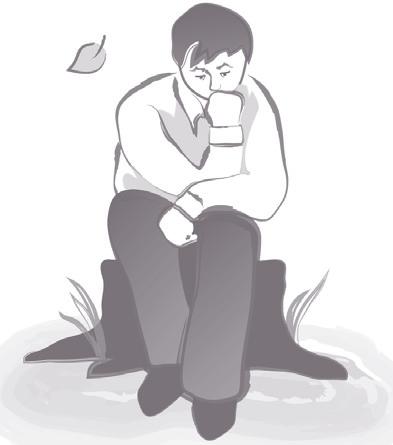
5 minute read
ENTRE NOUS
from May 2023

TLDR. Too long; didn’t read. “TLDR” is the rather curt response that can be thrown back at someone if the length of their text message or e-mail irritates the recipient. Texting and instant messaging are not ideal platforms for delivering detailed messages. So, if one of your friends or colleagues (or your mom) sends you a novel, you can simply respond “TLDR”, which indicates both a disdain for their verbosity and an assurance that you could not be bothered to even read their message.
The world of acronyms being what it is though, “TLDR” is also used now as a shorthand noun to announce an upcoming summary that will spare the reader the tedious task of wading in themselves, as in: “Let me give you the TLDR.” The meaning is something like: “I’ll spare you having to respond ‘TLDR’ to me by providing you with a summary instead.” We used to ask for the Coles Notes version. Now we can ask for the TLDR.
Depending on where your knowledge of TLDR lies, you might look at its current use as a noun as an exercise in promoting efficient communication. On the other hand, you might bemoan the demise of grammar and regret the overall shift away from a culture that reads let alone celebrates good writing. For this second type of reader, yes, you have become your parents and now might be a good time to also check when you last saw your doctor.
In this issue, if you did not already know, you will learn that with the closing of the Law Courts Inn (by the province, during COVID, based on out-of-date information and in the face of much opposition from the profession), the Lawyers’ Inn Society has been forced to seek out a new physical home. It has landed (at least temporarily) at the offices of Charest Reporting. Murray Clemens, K.C., meanwhile, has chimed in to encourage us to support all reporting services that provide us with spaces in which to interact directly with one another. The TLDR of those articles is: we should maintain collegiality within the profession.
Studies have shown that people tend to skip indented paragraphs when reading. We encourage you to do so here:
Collegiality is an essential aspect of the legal profession, and it refers to the quality of working cooperatively and collaboratively with colleagues. In a field where legal professionals must work together to achieve common goals, collegiality helps to foster a positive and productive work environment. A collegial work environment promotes trust, respect, and open communication among colleagues, which ultimately leads to better outcomes for clients. Additionally, collegiality can help to reduce stress and improve job satisfaction for legal professionals.
Collegiality is demonstrated through various behaviors and attitudes, including sharing knowledge and expertise, being open to feedback and constructive criticism, and maintaining a supportive and respectful attitude towards colleagues. Legal professionals who prioritize collegiality are more likely to work well in teams, resolve conflicts effectively, and build positive relationships with clients. By promoting a culture of collegiality within the legal profession, legal professionals can ensure that they work in an environment that is both supportive and productive.1
Have you ever been so bored in all your life!? The words bland and dull were invented to describe passages such as the two paragraphs above. We did recommend avoiding them. What, you might wonder, is wrong with them? Think of how the adults all sound in a Charlie Brown cartoon. That’s what’s wrong with them.
This text was generated using ChatGPT (currently banned in Italy), an AI service that will scour the internet and regurgitate information on any topic of your choosing in a writing style reminiscent of a grade 6 student suffering from a concussion. There is no fact checking, just a scouring and scrubbing and spitting out of information. We are assured that AI will learn as it interacts with humans and will get better at writing. It will not just pass bar exams; it will produce complex legal memorandums and even render decisions. Oh goodie.
Why on earth would we even want that? Too long; didn’t read? How about too complicated; didn’t think? Why have millions of people flocked to ChatGPT as a tool to assist them in their writing? Why not just … research and write? Does research not help us think about a topic? Is writing not part of the process of organizing our thoughts?
Why are so many people turning off their brains!? Look around you. Seemingly everyone is on a smartphone, swiping up and down and left and right looking at God knows what, avoiding human interaction, numbing themselves with shorts and reels and memes and utter drivel. How many times have you gone out for dinner and seen a perfectly handsome couple sitting across from one another on their phones without any apparent intent (or ability?) to speak to one another? Sometimes entire tables of fam- ilies or friends are all on their phones simultaneously—doing what? Sharing photographs of who they are with and what they are eating? It is utter antisocial madness. Perhaps we flock to artificial intelligence now because we have lost all semblance of actual intelligence.
The COVID-19 pandemic not only ended lives, but also thrashed social gatherings and with it traditional interactions that lawyers have historically had with one another—whether it was going for lunch or attending inperson conferences, meetings or social events, those experiences simply came to an abrupt halt. The resulting Zoom calls and Teams meetings are a poor artificial substitute for true face-to-face interactions with one another. More artifice. Trust us, we do not need more technology to help us maintain collegiality. We need to help ourselves and help one another by interacting once more—in person.
Do you really want artificial intelligence in your life, or do you want actual intelligence? As previously discussed in these pages: All practitioners habitually bewail the fact that the collegiality of the bar is being eroded by the exponential increase in its size. … There can be no doubt that it is easier and much more pleasant to practise against fellow members whom one knows and trusts. Members are less likely to attempt to upstage opponents they know and like and whose good opinion they cherish. Older members tend to lament the erosion of the atmosphere of collegiality at the bar. However, older members were voicing the same lament 40 years ago and, we suspect, doing the same thing at the turn of the century. It is, however, an unmistakable fact that the larger the bar (or any group) grows, the more difficult it is to foster an atmosphere of collegiality.
Collegiality does not refer to a comfortable, chummy, clubby old boy’s network. It is a valuable cornerstone of the foundation of the bar. It needs little explanation to convince anyone that clients are better served by lawyers who treat each other with trust and courtesy and can thus more effectively do business with each other.2
There is no app or web-based platform that can create collegiality for us. Lawyers need to get back out there, get together and start interacting again. There are people working hard at creating and maintaining spaces for us to do this. We encourage you to take advantage of such spaces and engage with one another in person. The profession is only going to benefit from lawyers being real with one another. And we know. TLDR.
Endnotes
WE provide sworn Affidavits, file them in the appropriate registry and return filed copies to you




WE serve the parties as instructed by you
WE file your documents in the appropriate registry and return filed copies to you
1. YOU SEND

YOU send your documents to WCTS
WE review the documents as to format and form










